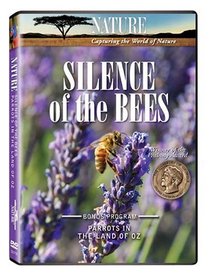| Creator: Murray F. Abraham Genres: Television, Documentary Sub-Genres: Television, Science & Technology Studio: Questar Format: DVD - Color DVD Release Date: 05/20/2008 Release Year: 2008 Run Time: 1hr 58min Screens: Color Number of Discs: 1 SwapaDVD Credits: 1 Total Copies: 0 Members Wishing: 2 MPAA Rating: NR (Not Rated) Languages: English |
Search - Nature: Silence of the Bees on DVD
  | Nature Silence of the Bees Genres: Television, Documentary NR 2008 1hr 58min Here's the buzz on two great episodes from television's most honored natural history series. Winner of the prestigious Peabody Award, "The Silence of the Bees" explores one of Nature's most baffling mysteries: the disappea... more » |
Larger Image |
Movie DetailsSimilar Movies
Similarly Requested DVDs
|
Movie ReviewsSo much for the birds and the bees! Jeffery Mingo | Homewood, IL USA | 09/12/2009 (4 out of 5 stars) "I'm used to being duped and buying things that don't have all they advertise. The reverse has happened here. This is not one documentary; there are two here. The bees aren't the first one: a work on parrots in Australia is. Why would one under-advertise their product? Further, I think humans like birds better than bees. I think we Americans like happy stories; the doc on birds has that; it's the doc on bees that is sad and depressing.
Even though the doc on birds focused solely on Australia, the work used an American narrator. In a way, that was a good thing, as we Americans see Aussie accents as exotic and might be lured away from listening to the narrator's message over his style. I had also heard that Western-born animals are devastating Australia and its marsupials. Supposedly cats have a field day on platypuses, koalas, etc. Here, they never state that parrots are harmed by animals foreign to their ecosystem. Also, I'm used to hearing of humans destroying animal environments. The overpopulation of humans is playing a role in pandas and Sumatran rhinos dying off. Here however, when Aussies bring up water deep in the ground or spread veggies to feed the livestock, the parrots take advantage of it. For the first time ever, a serious narrator in a documentary used the word "poo," rather than "excement." They show a bird that raises its chicks in a termite hill. Surprisingly, the bird don't eat the termite larvae inside. I would think all birds love all stages of insects just as much as I love the McRib! Many people brush off environmentalism. As far as they are concerned, they have sunscreen to lather on and don't fear the deteriorating ozone. They don't live in those islands that will disappear as the polar caps melt. They don't care about pandas and manatees anyway. However, this work says we'd all be eating only gruel if it weren't for the pollinating efforts of bees. Folk who like mysteries period will enjoy this work as it investigates numerous theories. I would say most viewers like easy answers and simple solutions; this doc should be lauded as it repeats that there is no one cause to the dying off of bees. I agree with theorist Carl Jung who posited that humans have always hated insects, rodents, and dying bodies. Along those lines, I want to save the bees, but looking at them close up was not pleasant. Remember in "The Fly" when Goldblum's character first sees the fly in his genes close up? Yuck! Those head-turning moments happen here. One reason folk like James Bond movies is that they tend to have international locations. The death of bees happens in the US, France, Spain, and all over. They showed how the Chinese are trying to pollinate trees on their own, but admit it's too costly and cannot be a permanent solution. Because the subject is so depressing, the doc makers had the foresight to ad a feature on what viewers can do to help. Taking a step back, maybe viewers like experiencing joy and pain consecutively. The way this work lifts one up and then pushes one off a cliff may be a satisfying experience to some viewers. The more I type, the more I realize how much I truly enjoyed this DVD." |













